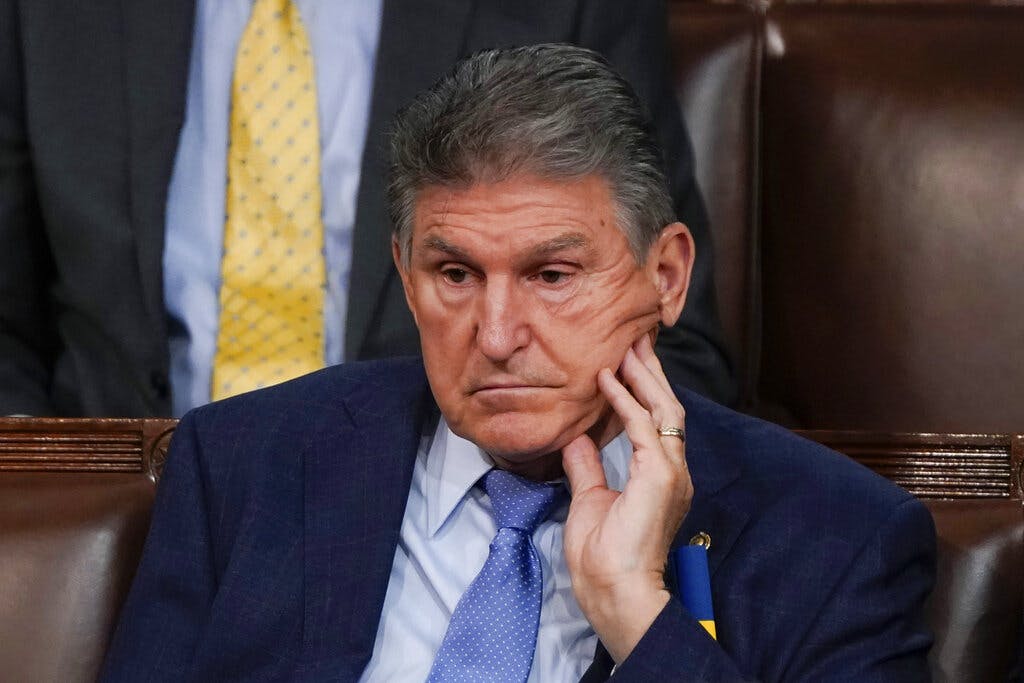Don’t Buy the Democrats’ New Talking Points on Huge Spending Plan
The clear target of this clumsy rhetorical shift is Senator Manchin, but the West Virginian shouldn’t buy it.

Concerns about growing deficits and inflation have given way to a spending spree as Congress, six months late, appears close to enacting a budget for the current fiscal year. Democrats have secured a $46 billion increase for non-defense programs while Republicans are getting $42 billion extra for defense.
Lawmakers won’t get much rest after they pass this budget-busting bill. The process for next year’s budget is already behind schedule, as President Biden is a month late in delivering his budget proposal to Congress. One wonders what is taking so long, as his State of the Union address made clear what to expect: the same stale proposals to expand the welfare state.
While the proposals are familiar, the talking points have changed. Build Back Better is dead. Now we are told the spending agenda will stop inflation and reduce deficits. The clear target of this clumsy rhetorical shift is Senator Manchin, but the West Virginian shouldn’t buy it. Even as the president and congressional Democrats pay lip service to Mr. Manchin’s demands, their aim is a spending agenda that will balloon long-term deficits while compounding the inflation we see today.
One would expect an administration eager for legislative victories to pivot away from its failed spending agenda. Runaway inflation and new geopolitical challenges from the Russian invasion of Ukraine provide ample reasons to do just that. Not this administration, though: In his State of the Union address, the president promised federally subsidized day care, expanded child tax credits, free preschool, free community college, permanent expansions to ObamaCare, and subsidized home and long-term health care.
These proposals should sound familiar; all were included in the president’s failed first-year budget. Coming on the heels of the $2 trillion CARES Act, the president’s last budget proposal included more than $5 trillion in new government spending over the next 10 years. President Biden promised to offset the huge spending increase with large tax increases on high-income families. Yet the tax hikes — by the administration’s own estimates — would only cover a portion of the price tag. The remaining $1.4 trillion would be deficit-financed.
Even these estimates relied heavily on budget gimmicks. The administration shifted the budget window to 15 from 10 years so Mr. Biden could claim the budget was deficit-reducing. The proposal assumed that the extended child tax credit would sunset before 2026. The president’s budget staff predicted $265 billion in tax revenue from increased IRS funding, far more than the estimates of Congress’s nonpartisan tax and budget experts.
It got worse. After facing initial resistance from Mr. Manchin and Senator Sinema, congressional progressives added further gimmicks to rein in the price tag. They proposed temporary extensions to several expensive tax credits to minimize their 10-year budget effect. These gimmicks were so outlandish the Congressional Budget Office estimated that without the sunsets, the Build Back Better bill would increase 10-year deficits by nearly $3 trillion.
Mr. Biden is now saying his next budget will reduce deficits and deliver his first-year budget priorities. Like his first budget, though, the gimmicks underpinning any promised deficit reduction should be obvious. His next budget will use sunsets, optimistic budget scores, and novel budget windows to claim illusory savings.
After the State of the Union, Mr. Manchin told reporters that he would support a tax-increasing reconciliation bill where the extra revenue is split equally between deficit-reduction and spending on “a 10-year program.”
The latter demand is an obvious signal that the senator remains opposed to the budget gimmicks that comprised Build Back Better. But that isn’t new. Throughout last fall, Mr. Manchin made clear the bill’s $3.5 trillion price tag was a nonstarter, and yet the progressives continued to ram the legislation through Congress.
It is admirable that Mr. Manchin continues to negotiate in good faith with the same progressives. Last year, however, his good-faith efforts only made them more recalcitrant. The result was that the Congress squandered much of 2021 debating a failed budget agenda when more important matters — like enacting a 2022 budget — loomed.
Mr. Manchin’s willingness to negotiate a new reconciliation bill threatens to waste more legislative time, while doing nothing to address the budget and economic challenges we face today. Mr. Biden’s speech has made clear he remains stubbornly attached to his first-year spending agenda.
Mr. Manchin should make his opposition equally clear, and demand the president and Congress focus on a bipartisan agenda that addresses the domestic and global challenges facing the nation.

